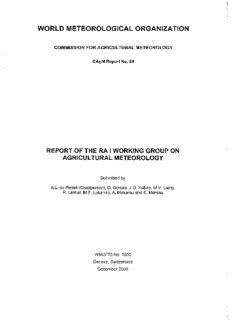
world meteorological organization PDF
Preview world meteorological organization
WORLD METEOROLOGICAL ORGANIZATION COMMISSION FOR AGRICULTURAL METEOROLOGY CAgM Report No. 84 REPORT OF THE RA I WORKING GROUP ON AGRICULTURAL METEOROLOGY Submitted by A.L. du Pisani (Chairperson), G. Goroza, J.G. Kabira, M.V. Laing, R. Lekhal, M.F. Lukando, A. Makarau and E. Mersha WMO/TD No. 1050 Geneva, Switzerland December 2000 CONTENTS Section I Synopsis of Activities A.L. du Pisani ......................................................................................... 1 Section 11 Technical Reports A. Makarau ............................................................................................. 3 Desertification E. Mersha ............................................................................................... 8 Armyworm Control J.G. Kabira ............................................................................................ 15 Weather and Animal Health M.V. Laing ............................................................................................ 29 Meteorology and Forest and Bush Fires M.F. Lukando ........................................................................................ 32 Crop-Weather Modelling T.F. Nikiema ......................................................................................... 41 Drought Section Ill Appendices I. Questionnaire related to Armyworm Control ..................................... 49 11. Questionnaire related to Crop-Weather Models ............................... 51 SECTION I 1 Synopsis of the Activities of the Working Group A.L. du Pisani Meteorological Services, Windhoek, Namibia In accordance with Resolution 12 (XI-RA 1), the Working Group on Agricultural Meteorology was established in 1994 by the eleventh session of the Association. I was invited to serve as Chairman of the Working Group. In March 1995 the following Rapporteurs were appointed: Dr A. Makarau, Zimbabwe: Desertification Mr R. Lekhal, Algeria: Locust Control Mr E. Mersha, Ethiopia: Armyworm Control Mr G. Goroza, Cote d'lvoire: Coordinator of the Rapportuers on Specific Crops Mr J.G. Kabira, Kenya: Weather and Animal Health Mr M.V. Laing, South Africa: Meteorology and Forest and Bush Fires Mr M.F. Lukando, Tanzania: Crop-Weather Modelling Questionnaires designed by Mr. J.G. Kabira (Kenya) on weather/climate and animal production, health and disease, by Dr M.F. Lukando (Tanzania) on crop-weather modelling, by Mr G. Goroza (Cote d'lvoire) on specific crops and by Dr A. Makarau (Zimbabwe) on desertification were sent to the Members for their responses. A meeting of the Working Group on Agricultural Meteorology of RA I (Africa) was held at the National Meteorological Services Agency of Ethiopia from 7-9 April 1998. Nine participants attended the meeting and only one member of the working group, Mr Lekhal, could not attend. Members reviewed the terms of reference of the Working Group and made a number of suggestions to deal with them. Following a short report from the Chairman, members presented their reports. There was good discussion following many of these reports and a number of useful suggestions were made to improve these reports. In view of the Twelfth Session of RA I from 14 to 23 October 1998 in Arusha, United Republic of Tanzania, Members discussed the contents of the reports of the Chairman of the Group and the final technical report of the Group to be submitted to this session. A timetable for submission of the final report was discussed and adopted. The meeting recommended that the Working Group on Agricultural Meteorology for RA I should be re-established with the following renewed terms of reference: • To review and evaluate the extent to which agrometeorological applications have been adequately addressed in the National Action Plans for the implementation of the United Nations Convention to Combat Desertification and provide guidelines for future responses from the Members. • To promote more active use of seasonal to inter-annual climate forecasts for sustainable agriculture in Africa. • To review information on weather and animal production and develop recommendations for practical agrometeorological applications for increased and sustainable animal production. 2 • In the light of the importance of transfer of proven agrometeorological technologies and their adoption at the farm level, to review and evaluate existing success stories and develop appropriate recommendations for the RA I region. • To review ongoing work on remote sensing, geographical information systems and modelling in the RA I region and develop recommendations to promote more active applications. • To determine the likely effects of trends in data ownership, restrictions and pricing policies on agrometeorological applications in the region. • To review and evaluate existing systems of combating bush and forest fires in Africa and develop guidelines for future implementation. • To review and evaluate existing systems of agrometeorological field stations and observations and develop guidelines for future developments. • To define and map areas of armyworm infestation of economic importance in Africa. The session further recommended that: (a) Efforts should be made to organize a meeting of the Working Group, mid-way during the next intersessional period, to discuss the contents of interim reports submitted by the Members, identify the actions needed and the modalities for the preparation of the final report and to discuss the proposals for the next meeting of the Regional Association. (b) Given past experience with regard to the responses to questionnaires sent out by the members of the group, it is important to make use of alternatives to questionnaires such as list servers for the group and use of e-mail to seek information from the agromet-internet discussion group established by WMO and FAO. (c) In the constitution of next Working Group it would be useful to ensure a certain degree of continuity of Rapporteurs, where possible, to take advantage of the work already carried out by them. (d) In order to ensure the transfer and adoption of proven agrometeorological technologies at the farm level, efforts should be made by the agrometeorological services in the RA I region to establish effective links with extension services and NGOs. With the excellent help of Or M.V.K. Sivakumar, Chief of the Agricultural Meteorology Division of WMO Secretariat, we have a report which, with the individual reports of the Rapporteurs, was submitted as the report of this Working Group to the session of RA I held in Arusha, Tanzania, in October 1998. The Working Group would like to express its sincere thanks to all the members of RA I who responded to the questionnaires and for their cooperation in furnishing the information which is given in this report. SECTION 11
Description: